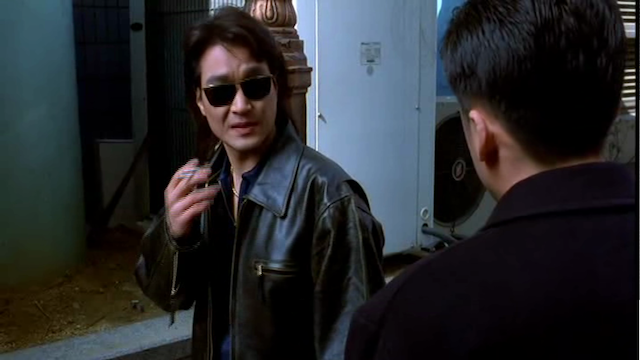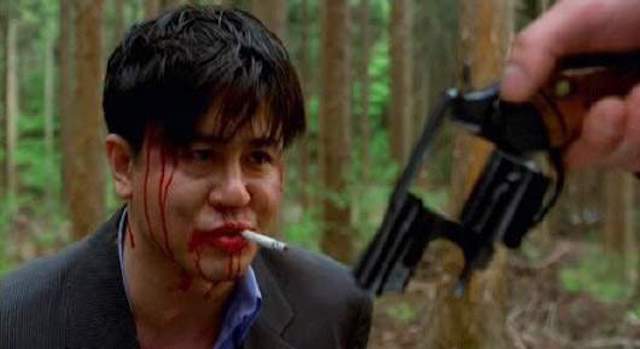If one considers the 21st century as the definitive era of modern Korean cinema (aka New Korean Cinema), then the 1990s must serve as a transitional period, a breeding ground for cinematic experimentation that foreshadows the upcoming Golden Age. In that sense, No. 3 is very much a transitional film, following in the footsteps of other like-minded movies in the jopok (gangster) genre such as Rules of the Game (1994), Runaway (1995), Born to Kill (1996), and Green Fish (1997). All these films share a common desire to forgo of the traditional “chivalrous” mobster in favor of a grittier alternative, often used in the service of social and political critique. The modern gangster and his cohort were frequently nothing more than vessels of allegory, sprinkled over with the occasional street fight, night-club brawl, or damsel in distress (of which they’re often the cause).
No. 3 stands out of the crowd as both the culmination of this trend, and a daring point of departure. Socially poignant, charmingly innovative, playfully witty, and unabashedly self-referential, No. 3 is a film much ahead of its time, using all the tools of post-modernism to explore human nature beyond its immediate cultural context. It’s a film about transitions; about the jump into a new millennium for which its characters – and perhaps its contemporary audience – are fundamentally unprepared.
Best classified as a black comedy, No. 3 follows the ambitious gangster Tae-ju (Han Suk-kyu), who as a result of a brave act of loyalty gains the favor of his boss and rises the ladder of his crime syndicate, becoming the 2nd in command, i.e. the No. 2. But as nothing lasts forever, Tae-ju soon loses the respect of his organization after a near-fatal bar fight, and descends back to the titular No. 3 position. Desperate, Tae-ju does everything he can to rise back up. Unfortunately for him, success is impossible. The conclusion of his saga is inevitably drenched in chaos and disarray.
The plot is intricate, and any attempt at a brief summary cannot do it justice. The film’s final confrontation arises from the convergence of multiple storylines driven by a wonderful cast of supporting characters, not one of which feels small or undeveloped. These include Hyun-li (Lee Mi-yeon), aspiring poet and Tae-ju’s wife; Jo-pil (Song Kang-ho), a failed assassin trying to restart his gang; and Dong-pal (Choi Min-sik), a foul-mouthed public prosecutor who develops an unlikely friendship with Tae-ju. The care that writer/director Song Neung-han has devoted to even the most minor character is perhaps the most enduring quality of the film.
It is really the characters that drive the plot. Their comic idiosyncrasies, sometimes so ridiculous that verge on the farcical, help illustrate the absurdity of their predicament, as well as the artifice of their norms and conventions. The film’s own carefree and playful attitude towards structure and technique only mirrors this intention. Right from the opening credits where the slot machine can’t decide if it’s a 2 or a 3, to the cartoonish depiction of Chinese proverbs above the characters’ heads, the filmmakers profess not to take themselves too seriously. Even the idea of masculinity, so integral to gangster genre, is turned on its head. The film takes every chance it has to laugh at the characters’ perceived “manliness,” effectively emasculating them. For instance, the intense fist-fight between Dong-pal and Tae-ju, a pivotal scene in the film, happens in a children’s playground. The irony of this juxtaposition is too delightful to ignore.
Shortly before their fight, Dong-pal’s says to Tae-ju, “You know what I hate the most? It’s the saying that you must hate the offense and not the offender.” While I’m sure there’s a moral message somewhere in there, I like this phrase because it illustrates the very core of the prosecutor’s character, and what he sees as a source of stagnation. To hate the sin but not the sinner takes away one’s responsibility (not in a moral or social sense, but an existential one) thus taking away one’s agency. Dong-pal is man of his own means. He doesn’t have much in life, but what little he owns he’s worked hard for it. His life, whatever it may be, is his own achievement. Most gangster movies portray the fall into lawlessness as a social inevitability caused by inequality and economic hardship. In No. 3, it’s more like climbing the corporate ladder, a path filled with personal choices and decisions.
Today, No. 3 stands as a rather unique artifact in the history of Korean cinema. Not old enough to be a forgotten classic and not recent enough to fit in with the established market, No. 3 is regarded as somewhat of a curiosity. Audiences and reviewers alike don’t know quite what to make of it. Though its influence in modern Korean cinema is undeniable, its individual merits are often neglected or underappreciated. The fact that it’s pretty hard to find a copy of the film also doesn’t help. Regardless, it’s a must-see for historians and enthusiasts alike.
John Atom

Comments
Post a Comment